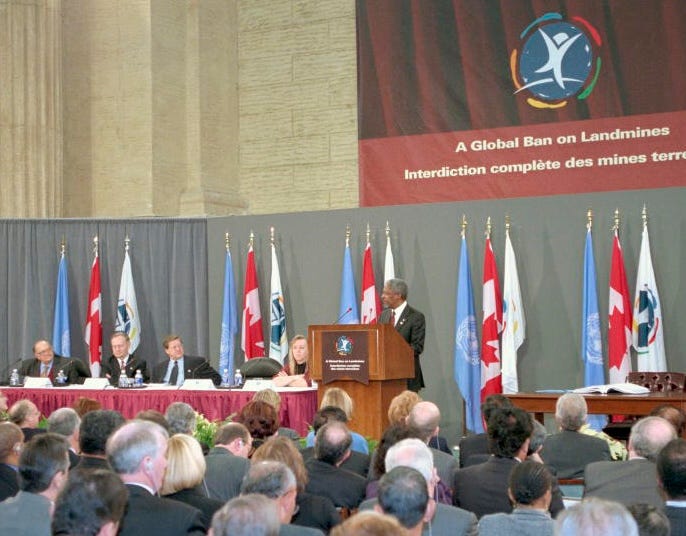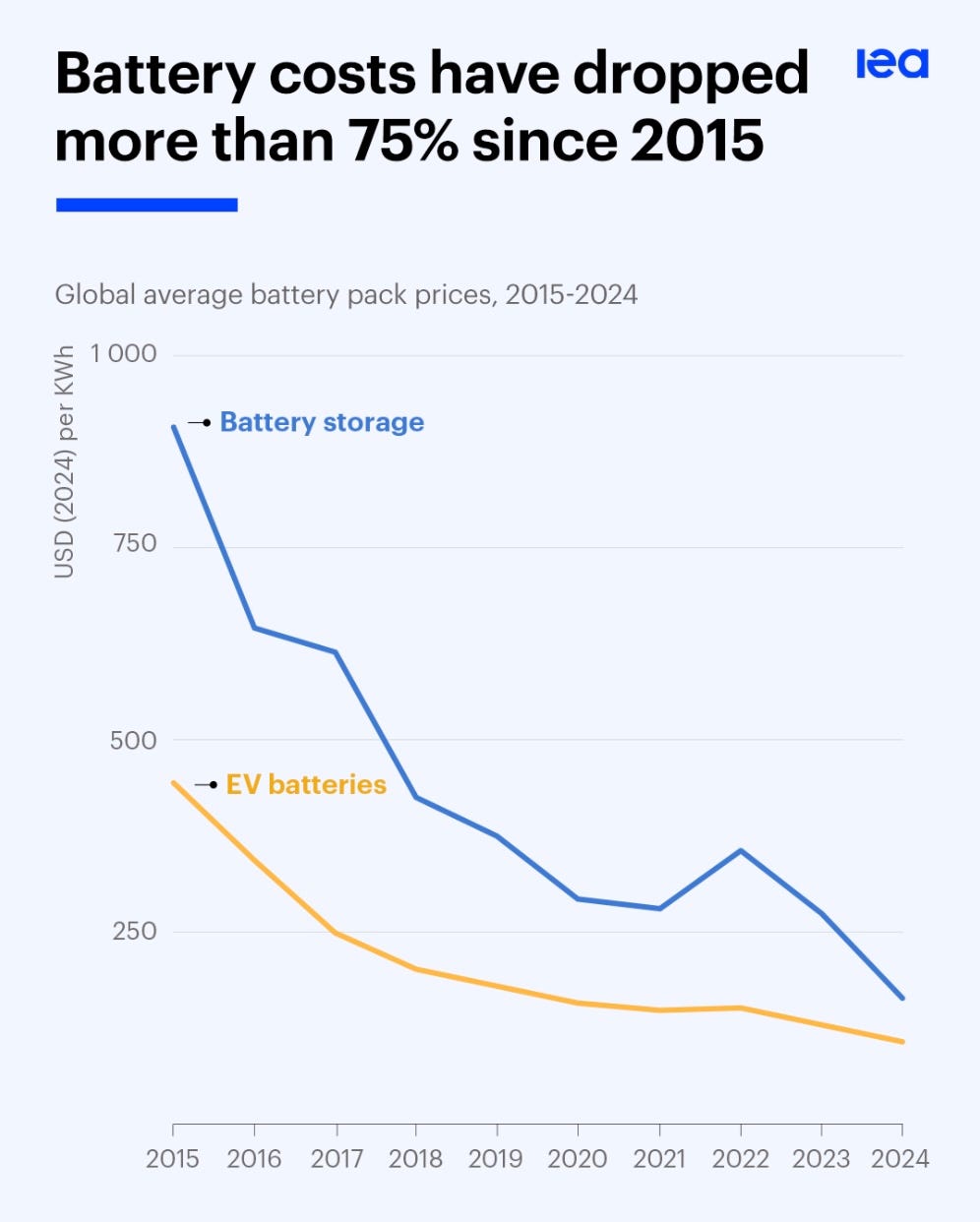More Landmines? New Pipelines? Panic Reactions Won’t Help Us Against Trump
Weakening the global landmine treaty to hold off Putin is a panic response, just like building new pipelines in Canada to hold off Trump. That makes oil and gas the landmines of our time.

When the history of Donald Trump and how we defeated him is written, the weakening of the global treaty to ban landmines won’t be near the top of the list of the outrages that brought him down.
But the news this week that four NATO countries are withdrawing from the treaty shows how deeply countries are panicking about Trump’s rise and his alliance with Russia’s Vladimir Putin. Just like the large proportion of Canadians, reacting to Trump’s declaration of economic war and his mutterings about Canada as a 51st state, who now support or somewhat support building new fossil fuel pipelines—even though two-thirds of us also want our next government to invest in renewable energy instead of fossil fuels and make climate action a priority.
Pro tip: We can’t have both.
The landmine treaty, adopted in Ottawa in 1997 and brought into force in 1999, was a monumental humanitarian achievement, supported by pragmatic reality. Brought to life through an intense, 14-month diplomatic effort by Canada and Norway and supported by a determined civil society movement, it succeeded because countries knew the story on landmines.
They’d been called a “weapon of mass destruction moving in slow motion” and had killed more civilians than both world wars, many of them children.
And they often didn’t even work as intended for the countries that deployed them. Many of the generals who weighed in on the treaty supported it, knowing that all it took was a severe storm, flood, or landslide (um, climate change?) to make your landmine map obsolete. After that, civilians and troops on both sides of a conflict were vulnerable to both sides’ mines.
But that was then, and this is now. In a joint statement, the defence ministers of Estonia, Latvia, Lithuania, and Poland “say they need to be able to use all means necessary, including anti-personnel munitions, to defend the alliance’s eastern flank from a potential invading Russian army,” Politico Playbook wrote this week. And with that, “one small slice of Canada’s piece of [the] international rules-based order is edging closer to obliteration in the face of our ever-changing, highly volatile, shifting geopolitical global landscape.”
Over the years, I’ve come to use “dodging landmines” as a kind of verbal shorthand for anticipating and preventing small inconveniences or breaches of etiquette. But this week’s news brings home a far more important reality: that new fossil fuel infrastructure is our generation’s landmine.
As Obsolete as an Oil Pipeline
Lloyd Axworthy, the Canadian foreign affairs minister who led the push to get the treaty across the finish line along with his Norwegian counterpart, Knut Vollebæk, is not impressed.
There may have been a time when an exploding landmine could serve as an early warning of an advancing enemy, Axworthy told Politico. But the advent of battlefield drones and other aerial surveillance has made that calculation obsolete.
You might even say…as obsolete as a new fossil fuel pipeline when the industry is entering its sunset.
“We can respond and provide deterrence without reverting back to a weapon that’s been very much decided by 80% of the world to being part of a taboo,” Axworthy said. “Let’s not just use them there. They’re just too destructive and long lasting on civilians.”
So “Canada needs to speak out against anything that undermines the treaty,” he told Politico. “Canada has a number of armed forces in Latvia as part of a NATO brigade, and that’s going to create some very complex problems for them, right?”
Beginning with, ya know, the reality that a landmine laid by “friendly” forces is just as deadly as a device that carries Putin’s signature.
Foreign Affairs Canada, with a few other priority files to deal with and a federal election now under way, had not responded to the latest landmine news as of Sunday morning. But Norway’s current foreign minister, Espen Barth Eide, was right on top of it.
"It's disturbing that these countries are considering such a move. While they face serious security challenges, anti-personnel mines have no place in modern warfare," he said.
"Anti-personnel mines make it difficult to rebuild after war, and they kill and maim people for many years after the war has ended,” Eide continued. “Destruction of agricultural land, threats to children on their way to school, and the unusability of entire areas are consequences that society suffers for decades.”
Change out a few words, tilt your head just slightly, and it isn’t hard to see the parallels to devastated landscapes, ecosystems, and communities, massive toxic waste spills, drastic health impacts, rampant human rights violations, corrupted national and international political systems, and a desperate global climate emergency—all brought on principally by burning the fossil fuels that the industry now wants to transport, then export via a new generation of pipelines.
A Global Inflection Point
If Bob Lawson sees dots connecting between the landmine treaty and the climate emergency, we should all be paying attention.
Lawson headed up the Foreign Affairs Canada staff team that managed the 14 months of meetings and negotiations that delivered the treaty. He was our client when the conference publishing firm that eventually launched The Energy Mix produced the summary report of the treaty conference, in time for national delegations to bring home a hard copy record of the sessions.
(Since then, many friends and colleagues have heard me quote a long-ago former client who sometimes ended the week with the words, ‘Thank goodness it’s Friday! Just two more working days ‘til next week!’ That was Bob, in the weeks leading up to the conference.)
“The landmine treaty is something that happened at an inflection point after the end of the Cold War,” he said in an interview yesterday. “The idea of a middle power coalition getting something done in a hurry looks a little fanciful right now,” but the treaty was one measure that “when the cards get thrown into the air, often during a crisis, there are things that happen.” And “some things can happen that are good.”
Our current inflection point “is scaring the wits out of a lot of people,” he added. Faced with the massive regional threat that Russia represents, it’s understandable to go right to the bottom of a toolbox of solutions and dust off the options you previously rejected…like landmines.
But even so, with the changes in battlefield detection that Axworthy described, Poland and the three Baltic states “are reaching a conclusion I don’t agree with,” Lawson said. With landmines, “you’re clearly creating a problem down the road for yourself, there’s no doubt about that. The contamination you’re creating will have to be dealt with” if the land is to be useful for any purpose—for kids trying to get to and from school with their hands and feet intact, or for villagers who need a safe lane to the centre of town.
“They’re buying themselves a Cambodia-size problem which will be decades in the remediation,” he added, referring to a place that is almost completely free of landmines today, nearly 30 years after it was identified as the world’s most mine-infested country.
The Choices Are Clear
But this is a different time. And Lawson said the challenge for the landmine treaty applies equally to climate change and climate solutions.
“Like any inflection point, ideas will emerge that are enabled and pursued by certain agendas, and it’s going to be a struggle,” with direct challenges to “all the infrastructure, laws, and science-informed regulatory frameworks that were put in place when we believed those things were important.”
The status quo brought on by Trump and his Russian puppetmaster (my words, not his) amount to “a series of facts” that lead to a “struggle over meaning,” Lawson added. “Do we believe we should double down on the rule of law because that’s what makes us different from the Russias and the Trumps? If we do, that takes us to a place where some of these things are bad ideas….
“It’s precisely because we face existential threats that we have to double down on the things we hold dear and make sure we’re moving in the right direction.”
Canada’s climate narrative has been “moving toward the right place,” with an emphasis on “energy independence, sovereignty, and true resilience to outside pressure,” he said. Now, Trump’s manufactured crisis “is an opportunity to rethink all the things that kept us behind. And other people are thinking exactly the same thing. So this is the struggle.”
The choices for Canada, in response to Trump and in the federal election that is now upon us, couldn’t be more clear.
Behind Door #1, we have the latest push by the fossil industry and its hired hand in the Alberta premier’s office, trying to resurrect failed pipelines that no longer have a corporate backer willing to finance or build them. Even with accelerated approvals, there’s no chance they’ll be in operation before Trump’s second term is a nightmare in the rear view mirror, little likelihood that they’ll come in on time or on budget, and every chance they’ll end up as multi-billion-dollar stranded assets as global oil and gas demand declines.
Behind Door #2, we have a global boom in renewable energy, battery storage, clean energy manufacturing, and energy efficiency investment and deployment, all relying on proven technologies that are practical, affordable, and beginning to scale up. Most of Canada’s biggest provinces are embracing the shift to one degree or another, with petrostate Alberta standing out as the major exception.
Pre-Trump’s annexation threat, the best arguments for the energy transition were the opportunity to rapidly reduce climate pollution. Build local resilience against the next climate-induced storm, heatwave, wildfire, or power outage. Create hundreds of thousands of good, steady jobs. Adopt energy options that build community and cohesion rather than dividing us. And protect Canada’s economy along the way.
Post-inflection point, all of those gains take on a more urgent, existential tone as cornerstones of our national survival and sovereignty. They’ve even acquired a new hashtag: #elbowsup.
Mitchell Beer traces his background in renewable energy and energy efficiency back to 1977, in climate change to 1997. Now he and the rest of the Energy Mix team scan 1,200 news headlines a week to pull together The Energy Mix, The Energy Mix Weekender, and our weekly feature digests, Cities & Communities and Heat & Power.
Chart of the Week
South Dakota Blocks Land Buys for Carbon Pipelines as Opposition Crosses Party Lines
Canada Pours Nearly $450M into New Nuclear Subsidies
Councillors, Citizens Weigh Severe Fire Safety Risk from Trans Mountain Pipeline Tank Farm
Hydrogen Falls Short as a Practical, Cost-Effective Fuel
CBC Climate Correspondent Has Her Own Mission on Scientific Voyage to Antarctica
Wall of Criticism Greets PBO Analysis of Oil and Gas Emissions Cap
‘Not If, But When’: Cities Face Rising Climate Risk as Downgrade Jolts U.S. Municipal Bonds
What a Nationwide Grid Network Would Mean for Clean Energy in Canada
Advocates Push to Ditch Gas Amid Soaring Prices in Ontario, B.C.
Tesla products now excluded from B.C. Hydro rebates in response to U.S. tariffs (CBC News)
Jolt gets $194M loan from CIB to ramp up EV chargers in Canada (Sustainable Biz Canada)
St. Thomas VW plant facing EV sector 'headwinds,' delays possible (London Free Press)
UK emissions fell to lowest level since 1872 last year, analysis finds (The Independent)
Merz reaches deal on infrastructure fund by promising Greens €100B for climate action (Clean Energy Wire)
German lawmakers oppose Chinese wind project on sabotage fears (Nikkei Asia)
Canada should look south to the Caribbean amid Trump threats (Policy Options)
Just Energy Transition Partnership (JETP) can succeed without the United States (Institute for Energy Economics and Financial Analysis)
School Disruptions from the LA Fires Hit Latino, Disadvantaged and English-Language Learners Hardest, Experts Find (Inside Climate News)
Warming climate should be top priority, Olympians urge IOC presidential hopefuls (Canadian Broadcasting Corporation)
Under Trump, the U.S. scores own goal in carbon removal game (Globe and Mail)
UK gamble on solar geoengineering is like using aspirin for cancer (The Guardian)








Great post Mitchell!
thanks for this important piece connecting dots Mitchell. The landmines treaty of countries coming together to address a problem is key, and has been international norm for over 20 years - saving lives of ordinary people & returning land to communities worldwide. There are many lessons of that and the unusual multilateralism efforts of other countries wanting to address crises together can and will come forward at this time in history too -such as the Fossil Fuel Non-Proliferation Treaty https://fossilfueltreaty.org/